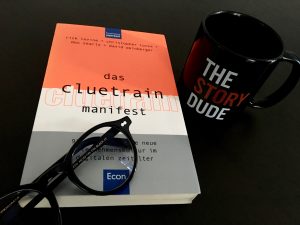Recently I read a very well-written article dealing with the storytelling buzz from a content marketing perspective. Two central messages of the reflections were:
- Content marketing is more than just storytelling.
- Well-told stories from the world of a brand are the salt in the soup of content marketing.
Story or content? - Hen or egg?
Here's what comes to mind.
- Storytelling is more than content marketing.
- Storytelling is more than well-told stories from the world of a brand.
Anyone who does content marketing, and every company, every brand should do this intensively, must understand that storytelling in the sense of "well-told stories" is only the activating implementation of something that actually makes story effective. It is our values and desires.
Well-told stories - that's difficult enough. That's why there are so few, whether in film and television, in literature or in marketing. But in any case, there are more well-told stories than there are good stories. Good stories - stories that go to the root of what makes us human. They go to where we humans have grown: to our hearts. To our soul. Where that which is really important to us lives. Where we care about something - where we care about ourselves. There, where truth lives.
Brand is more than product + advertising.
Truth, values, longing - this may sound rather pathetic for the mundane world of marketing communication. But if you want to build a real brand, there is no way around it. Because we don't buy products, we buy what we want to be.
Product + logo + advertising is therefore far from being a brand. It just looks - often confusingly - similar, often powerful and mighty successful. This worked quite well for almost 150 years. But those times are over.
The internet has changed everything. How people use media, what media they use, what media are, what all can be a medium ... And above all, the internet has totally changed the relationship between people and companies. It starts with the realisation that what you know as order numbers, Nielsen numbers and end users are actually people and leads to the fact that markets are now conversations between those people, 24/7, faster and smarter than most businesses. And that is a good thing.
This idea comes from the US-Americans Rick Levine, Christopher Locke, Doc Searls & David Weinberger and was described in the Cluetrain Manifesto : "We are not seats or eyeballs or end users or consumers. We are human beings and our reach exceeds your grasp. Deal with it."

The Cluetrain Manifesto defined in 1999 - and in 2015 in an update as New Clues - the relationship between companies and their customers in the age of the internet.
Differentiation through relevance.
What may seem like the end of the world for the old-fashioned advertisers is actually the description of a paradise for all those brands, companies and organisations that are serious about their audience and have understood where their opportunities and responsibilities lie. In relevance to people, because that is where distinction and thus relationship and meaning are created. That is brand, everything else just the noise before the defeat.
Tim Berners-Lee, who put the first website online on 6 August 1991 and is considered the inventor of the WorldWideWeb, understood the web from the very beginning as a social achievement, not as a technical one, i.e. the perfect platform for what needs to be done. And this is what John Steinbeck already told us story insiders: "If a story is not about the listener, he will not listen. And here I make a rule: A great and interesting story is about everybody, or it won't last."
So the story of a brand can never be about the brand, but only about its audience - i.e. the shared values and aspirations. Here is a wonderful example from Dove how this can work in advertising:
And here's another one:
And here you can browse what's next in content marketing. Finally, Dove has also taken this step and not just many years of good commercials around their fantastic brand story: For more self-esteem.
So: without a story, you can pick your stoytelling and your content marketing - as they like to put it in Vienna - "on the belly".
We Story Insiders say:
- Storytelling revolves around the shared value network of the audience and a brand. That's why it's best to talk about story sharing.
- With storytelling, a brand activates the desire world of its audience - ideally with well-told stories.
- Content marketing is a fantastic method for this, if it is used correctly, and especially if it is not understood as a prettier word for surreptitious advertising.
- Let's go!
Story is a question of attitude and an indispensable necessity for successful communication anyway, but for a successful company, for the existence of a brand as well and for content marketing even more so. What do you want to talk about?
Regardless of whether it's a global corporation, SME or EPU - every person, every brand, every company has a story and stands for something. Or for nothing, because you can't have no story. In the worst - and quite common - case, however, only one issue remains: the price.
That's why my grandmother, old Story Dudette, answered my question as to which came first, hen or egg: "I haven't the faintest idea, my little Story Dudette. But I can guarantee you one thing: No Story. No Glory."
